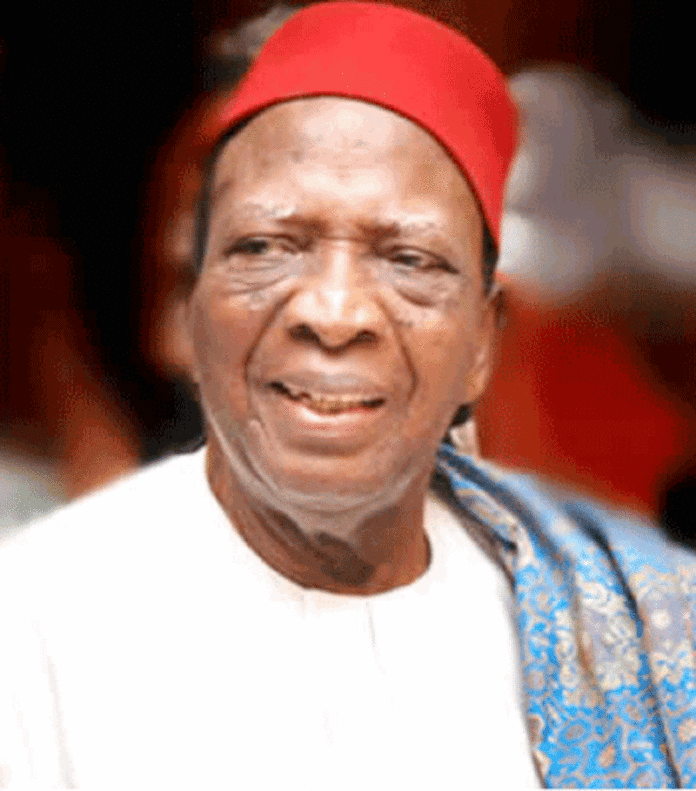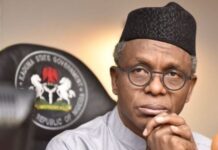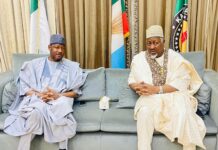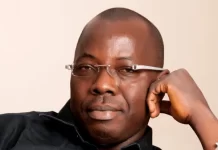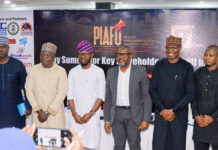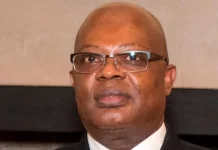By Professor Ben Nwabueze
BACKGROUNDS AND FACTS OF THE CASE
In all the circumstances of the case, President Buhari’s role and inconsistent action in the prosecution and trial of the Senate President, Dr Bukola Saraki, leave much to be desired, in terms of their compromising impact on his integrity. The background to the case is a relevant circumstance to be taken into account. Dr Saraki got himself elected by the Senate as its President in place of a person, Alhaji Senator (Dr) Ahmed Lawan, a devout moslem from Yobe State in the far North, and associate of President Buhari, favoured for the job by the President and his ruling All Progressive Congress (APC). Dr Saraki’s election was an affront to both the President and the ruling APC, and the sanction for the affront was to have him (Dr Saraki) removed as Senate President. His prosecution and trial was considered a surer option than going through the Senate for a removal vote.
It may be recalled that, as part of the ill-motivated design to get him removed as Senate President in order to make way for President Buhari’s favoured aspirant, Dr Saraki was also prosecuted for forgery of the Senate Standing Rules, but the prosecution was later withdrawn when write-ups in the media showed it (i.e. the prosecution) to be a perversion of the rule of law and its processes. It is gratifying that, till date 4/3/2018, the plan to remove Dr Saraki as Senate President has not succeeded; it is gratifying because he is serving, to some extent, as a checkmating force, visible to the public, against President Buhari.
Accordingly, on 11 September, 2015 a deputy director in the Federal Ministry of Justice filed an application in the Code of Conduct Tribunal (CCT), Abuja, asking for the commencement of trial of Dr Bukola Saraki, President of the Senate, Federal Republic of Nigeria, on a charge of false declaration of assets, with 13 counts – Charge No. CCT/ABJ/01/2015 dated 14 September, 2015. The application was granted by the Tribunal, sitting with its Chairman, Justice Danladi Umar, and one other member, Mr Agwadza Atedze, which directed that a summons should be issued commanding the accused to appear before it and plead to the charge. On 17 September, Dr Saraki, through his counsel, filed an application praying the Tribunal to quash and/or strike out the charge against him. After due hearing, the application was dismissed on 18 September, 2015. By its ruling dismissing the application, the Tribunal also issued a bench warrant ordering the Inspector-General of Police to arrest and produce the accused in the Tribunal on 21 September, 2015.
Another relevant circumstance is that the CCT is, structurally, within the Executive Branch (under the Ministry of Justice) and therefore subject to the directing authority of the President as Head of the Executive Branch; it is not part of the Judicature: see the definition of judicial office in section 318 of the Constitution.
The accused then applied to, and obtained from the Federal High Court, (FHC) Abuja, an order dated 17 September, 2015 directing the Tribunal to appear before it on 21 September 2015 to show cause why the proceedings before it (i.e. the Tribunal) should not be halted. The Tribunal refused to comply with the order of the FHC, and went ahead with the trial, which was eventually halted by the Supreme Court.
THE TRIAL BEFORE UMAR OF THE CCT AFFRONTS OUR ENTIRE SYSTEM OF FAIR HEARING AND JUSTICE
There is no question but that Dr Saraki must face trial for the criminal offences alleged against him. But he has a constitutional right, in the emphatic words of the Supreme Court in Sofekun v. Akinyemi, (1981) INCLR 135 per (Fatayi-Williams CJN), to” be tried in a court of law where………he would be sure of getting a fair hearing.” If the trial must be before the CCT, notwithstanding that it is not a court of law of competent jurisdiction, he (Saraki) cannot be guaranteed a fair hearing before a tribunal already tainted by serious allegation of corruption against its Chairman, Danladi Umar, and on the part of which bias or a likelihood of it seems manifest. A court is supposed to be a sacred temple of justice, and those manning it should be untainted sentinels of justice. In a matter of such crucial importance in the affairs of the country, judicial notice should be taken of the allegation of corruption leveled against Danladi Umar in the Sunday Vanguard of November 15, 2015, which makes it necessary that, if the trial of Dr Saraki must be before the CCT, then, Danladi Umar must step aside until he is cleared of the allegation of corruption against him.
The newspaper report discloses an investigation by the Economic and Financial Crimes Commission (EFCC) of a N10 million corruption allegation involving Umar as chairman of the CCT and the former Deputy Controller-General of Customs, Rasheed Taiwo, N1.8 million of which had reportedly been paid by Taiwo and collected on Umar’s behalf by his personal assistant, Gambo Abdullahi. The newspaper report also disclosed that the two other members of the CCT, Robert Odu and Agwage Atedze, feeling so embarrassed by the allegation, had refused to sit with Umar, and that in a joint letter to former President Goodluck Jonathan, dated April 4, 2014, the two members had said as follows:
“May we with respect draw His Excellency’s attention to the allegation of N10 million bribe made against Justice Danladi Yukubu Umar, current chairman of Code of Conduct Tribunal, Abuja, which is being investigated by the EFCC.
“We, the two members of the CCT and the entire staff, are embarrassed and saddened by this allegation because a tribunal set up to check corruption should not be accused of being corrupt. This would not be in keeping with the transformation agenda of the administration.
“We are mindful of the fact that the Federal Government has zero tolerance policy for corruption, and this is the reason for the establishment of the CCT as one of the agencies to fight corruption in all its ramifications.
“It is our prayer therefore that this allegation will be looked into so that the tribunal can start sitting in the interest of litigants and their counsel.”
The Sunday Vanguard of November 15, 2015 further reported that, based on findings of its investigations on the matter, the EFCC raised a two-count charge against Umar and his PA, Gambo Abdullahi, but for reasons unknown, the Commission later dropped Umar’s name from the charge sheet and took only his PA to court, which left Umar to continue functioning as CCT Chairman and to preside over Saraki’s case, sitting with one other member, Agwadza Atedze, who earlier signed a letter declining to continue sitting with Umar.
The same Sunday Vanguard issue again reported that, based on the report and findings of the EFCC investigations, the former Attorney-General of the Federation (AGF), Mohammed Adoke SAN, wrote on May 7, 2015 to former President Goodluck Jonathan, as follows:
“I am of the humble opinion that the current state of affairs in which the CCT is unable to sit while the institution is increasingly diminished by a pall of suspicion, should not be allowed to fester as it will expose the institution to public ridicule and undermine this administration’s effort to combat corruption.
“IN the light of the foregoing therefore, Your Excellency may wish to initiate the necessary steps for the removal of the CCT chairman from office.”
What emerges from all these reports is that Umar faces a serious risk of prosecution and removal from office on corruption charges. The person who has the power to avert or to save him from the risk is the President who, as Head of State, personifies and incarnates the Federal Republic of Nigeria (FRN) the complainant in the criminal prosecution against Saraki, which makes him (i.e. the President) a party to the proceedings. This naturally would create an inclination on the part of Justice Umar, as Chairman of the CCT, presiding over Saraki’s case, to want to use the case to ingratiate himself with President Buhari to get him to save him (Umar) from the threatening risk of prosecution and removal from office. Saving himself from the risk of prosecution and removal from office creates in Umar a personal and even a pecuniary interest in the case, in the form of his remunerations and other perquisites of office, which would incline him to want to favour FRN, in effect President Buhari, against Saraki. See on this, Adebesin v. State (2014) 4 S.C. (Pt 111) 151. In addition, FRN, personified and incarnated by President Buhari, is Umar’s employer and Umar is its employee. It has been held by the Court of Appeal in Adio v. Att-Gen Oyo State (1990) 7 NWLR 451 that the employer-employee relationship is a circumstance that gives rise to bias. It is not reasonably to be supposed or be expected that Justice Umar can be impartial or unbiased in adjudicating the case between the Federal Republic of Nigeria (FRN), again as personified by President Buhari, against Saraki. There can be no greater mockery of the whole notion of impartiality in any adjudicatory system than that Umar, with the threat of prosecution and removal from office by the FRN hanging over his head, should have been allowed to adjudicate as presiding judge in the circumstances of this case. Bias on the part of Umar seems to be clearly manifest in all the circumstances surrounding the case.
Besides, the manner in which the trial was being conducted by Umar manifests also a certain overzealousness that suggests at least a real likelihood of bias on the part of Umar against Saraki or a lack of impartiality – as, for example, the hostile attitude towards Saraki’s request for stay of proceedings based on his objection to the Tribunal’s jurisdiction, as manifested in (a) its refusal to accede to the request; (b) its refusal to obey the FHC’s order dated 17 September 2015 to appear before it to show cause why the proceedings should not be stayed; and (c) its going ahead, in spite of (a) and (b) above, with the proceedings, by issuing a bench warrant for Saraki’s arrest on 18 September, 2015, leading to his team of lawyers walking out from the proceedings in protest and to the Supreme Court eventually staying the proceedings. The speed and what appeared to be a desire to conclude the trial as hastily as possible, as if conviction and the removal of Saraki as Senate President were the pre-determined purpose of the prosecution and trial. These clearly are circumstances from which a real likelihood of bias may be inferred.
As the Court of Appeal held in Omoniyi v. Central School (1988) 4 NWLR (Pt 89) 458, “the term ‘real likelihood of bias’…must mean at least ‘a substantial possibility of bias.’” The Court adopted the words of Lord Denning MR in Metropolitan Properties Co. Ltd v. Lannon, [1969] 1 Q.B. 577 at p. 599, as follows :
“In considering whether there was real likelihood of bias, the Court does not look at the mind of the justice himself or at the mind of the chairman of a tribunal, or whoever it may be who sits in a judicial capacity. It does not look to see if there was a real likelihood that he would, or did, in fact favour one side at the expense of the other. The Court looks at the impression which would be given to other people. Even if he was impartial as could be, nevertheless, if right-minded persons would think that, in the circumstances, there was a real likelihood of bias on his part, then he should not sit. And if he does sit, his decision cannot stand.
However, it is necessary that there must be circumstances from which a reasonable man would think it likely or probable that the justice, or chairman, as the case may be, of a tribunal would or did favour one side unfairly at the expense of the other. The Court will not inquire whether he did, in fact, favour one side unfairly. Suffice it to think that people might think it did. The plain reason for this is that justice is rooted in confidence; and confidence is destroyed when right-minded people go away thinking: the Judge is biased.”
Thus, in this case, if actual bias is not present, a real likelihood of it does clearly exist.
When bias or the likelihood of it is present in a case, as in the Saraki case, its effect, as the Court of Appeal held in Denge v. Ndakwoji (1992) 1 NWLR 223, is not only to diminish the stature and integrity of the judge, but also to destroy the foundation of his judgment, however sound and consistent with the Rules of Court, pleadings and evidence”, citing in support Omoniyi’s case, supra. In more precise terms, it vitiates the entire proceedings. “If actual bias is proved”, the Supreme Court held in a 2014 case, Adebesin v. State (2014) 4 S.C. (Pt 111) 152, “the proceeding is flawed and vitiated for contravention of section 36 of the Constitution of Nigeria 1999:” see the numerous other decisions to the same effect cited in the above cases.
Despite the corruption accusation against Umar, and despite the fact that the CCT is, structurally, within the Executive Branch and within his directing authority, President Buhari did nothing to get Umar to withdraw from presiding over the Saraki case. (The then Chief Justice of Nigeria, Justice Mariam Mukhtar, had disclaimed power to get Umar to withdraw from the case, because the CCT is not part of the Judiciary). And so the trial, with Umar presiding, continued. At its conclusion, however, Umar, to everyone’s astonishment, dismissed all the charges against Saraki as not having been proved by evidence adduced before the Tribunal. Umar having failed to deliver by convicting Saraki, EFCC re-clamped on him the corruption charges earlier dropped against him.
Surprisingly, despite all this, Umar is yet to withdraw as Chairman of CCT, as at 5 March, 2018, and was presiding over the trial of Rasheed Owolabi on assets falsification charge – the same Rasheed Owolabi involved in the N10 million bribery case pending before the CCT led by Umar. The Court of Appeal ruled that Owolabi could not have a fair hearing before the CCT under Umar, and that he (Umar) should withdraw from presiding over the trial of Owolabi in the interest of the demands of fair hearing and justice.
A BIZARRE DEVELOPMENT IN THE CASE
A somewhat bizarre development in the case, development exhibiting marked incongruities, took place on 16 February, 2018. According to a report in the Vanguard of 20 February, 2018, the Attorney-General of the Federation (AGF), Abubakar Malami, had asked the Acting Chairman, EFCC, Ibrahim Magu, to “explain why the agency filed corruption charges against Chairman of the Code of Conduct Tribunal, Danladi Umar”, considering that the EFCC had “on two occasions cleared the CCT boss of complicity in the N10 million bribery allegation”, and whether the filing of the charge was on his (the AGF’s) “instruction or direction”. A similar query was sent to the private legal practitioner engaged by EFCC to handle the case to explain who gave him the “fiat (authority) to file the charges against the CCT Chairman”. It is not known whether the EFCC did what it did with the approval of the President, and whether the AGF’s query to the EFCC Acting Chairman and the private legal practitioner was cleared with or authorised by the President. But, however that may be, the inconsistency in the actions of both the EFCC and the AGF simply compromises the integrity of the President, in whose name the two sets of action were taken.
But the query by the AGF to the EFCC involves another compromising inconsistency. Under the Constitution, the AGF has undoubtedly the “power to institute and undertake criminal proceedings against any person before any court of law in Nigeria, other than a court-martial, in respect of any offence created by or under any Act of the National Assembly” (section 174(1). Yet the power has to be taken in conjunction with the provisions of the EFCC Act 2004. The provisions of the Act in point here are in section 6, which says:
“6 : The Commission shall be responsible for –
- the enforcement of all economic and financial crimes laws and the co-ordination of enforcement functions conferred on any other person or authority….
- (m) taking charge of, supervising, controlling, co-ordinating all responsibilities, functions and activities relating to the current investigation and prosecution of all offences connected with or relating to economic and financial crimes” (emphasis supplied).
The words “shall be responsible” in section 6 of the EFCC Act imply and seem in the context clearly intended to imply that the powers thereby conferred on the Commission exclude the same or similar power in any other person or authority. The intended effect is to make the Commission the sole authority for the enforcement of all economic and financial crimes, as defined in section 46– i.e. to the exclusion of the Nigeria Police Force (NPF) and the Attorney-General as the instrumentalities established by the Constitution for the enforcement of the laws with the limitations it imposes on them.
To the extent that the powers of the EFCC for the enforcement of economic and financial crimes laws do not exclude those of other authorities or persons, the latter are subjected to its supervision or control, and can only have and exercise subordinate power. The subjection or subordination arises from the words “shall be responsible” as well as from the phrase “the co-ordination of enforcement functions conferred on any other person or authority” in section 6(c) (emphasis supplied), and, more explicitly and unequivocally, the phrase “taking charge of, supervising, controlling, co-ordinating all responsibilities, functions and activities relating to the current investigation and prosecution of all offences connected with or relating to economic and financial crimes” in section 6(m) (emphasis supplied).
As regards the AGF in particular, the provisions in section 6 of the Act deprive him of the control over all criminal prosecutions vested in him by section 174 of the Constitution (section 211 in the case of the Attorney-General of a State). He is now placed under the supervision and control of the Commission’s Chairman and has ceased to be the controller as regards prosecutions of economic and financial crimes. Prosecution of economic and financial crimes by the EFCC or by a private legal practitioner engaged by it does not, therefore, require the fiat, authority, instruction or direction of the AGF. Whilst the provisions of section 6(c) and (m) of the EFCC Act seem inconsistent with the powers of the AGF under section 174 of the Constitution, they remain the law and binding on the AGF until declared null and void for such inconsistency by the courts; it smacks of anarchy and impunity for the AGF, before the provisions are nullified for unconstitutionality by the courts, to act as if those provisions did not exist. Remarkably, neither the President nor the AGF has apparently taken any steps to get the provisions declared null and void by the courts.
Professor Ben Nwabueze
Lagos, March 3, 2018

